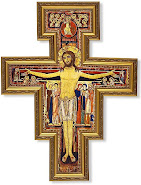Scott Hahn: The Ecclesial Locus of Theology and Exegesis
 In his article, The Authority of Mystery: The Biblical Theology of Pope Benedict XVI [1], Dr. Scott Hahn discusses Pope Benedicts central teachings on biblical theology. Hahn recognizes the fundamentals of Benedicts approach to Biblical text, 1) that the Word of God cannot be separated from the people of God in which the scriptures are revered 2) that Scripture must be read in lightof the living faith of the Church. I've attached the text below to clarify more on these fundamentals. . .
In his article, The Authority of Mystery: The Biblical Theology of Pope Benedict XVI [1], Dr. Scott Hahn discusses Pope Benedicts central teachings on biblical theology. Hahn recognizes the fundamentals of Benedicts approach to Biblical text, 1) that the Word of God cannot be separated from the people of God in which the scriptures are revered 2) that Scripture must be read in lightof the living faith of the Church. I've attached the text below to clarify more on these fundamentals. . .
"Benedict does not base his hermeneutic of faith and biblical theology on philosophical or methodological preconceptions of his own. Indeed, his approach to the biblical text grows organically from the historical structure of revelation, that is, from the actual manner in which the Word of God was created and handed on.
As Benedict notes, the clear finding of critical exegesis (the interpretation of text/scripture) is that Scripture is the product of the Church, that its contents originated in an ecclesial context and were shaped over long years by the Church’s proclamation, confession, catechesis, and liturgical worship. Considered historically, then, there is an obvious and undeniable “interwoven relationship between Church and Bible, between the people of God and the Word of God.”
Benedict bids us to pay close attention to the history of the early Church and the original inner unity of Word, sacrament, and Church order and authority. That history demonstrates that the institutions and practices of the Church are not artificial or arbitrary later constructs, but organic developments of the people of God’s encounter with the Word of God. Put another way, the structure of revelation and of the faith—how the early Church heard the Word and responded to it—is itself the source of the Church’s sacramental worship, its teaching office, and its principles of governance.
As Benedict notes, the criteria for determining which books were truly the Word of God were primarily liturgical:
"A book was recognized as “canonical” if it was sanctioned by the Church for use in public worship. . . . In the ancient Church, the reading of Scripture and the confession of faith were primarily liturgical acts of the whole assembly gathered around the risen Lord."
The Church, then, from the beginning, was understood as the viva vox, the living voice of Scripture, proclaiming the Word but also protecting the Word from manipulation and distortion. As the confessional and sacramental life of the Church were the criterion by which the canon was formed, the Scriptures were intended from the beginning to be interpreted according to the rule of faith or the Creed, under the authority of the apostles’ successors. And again, historically speaking, the Church’s proclamation and interpretation of the Word was ordered to a liturgical or sacramental end—the profession of faith and baptism."
"The original sphere of existence of the Christian profession of faith. . . . was
the Sacramental life of the Church. It is by this criterion that the canon was
shaped, and that is why the Creed is the primary authority for the
interpretation of the Bible. . . . Thus the authority of the Church that speaks
out, the authority of apostolic succession, is written into Scripture
through the Creed and is indivisible from it. The teaching office of the
apostles’ successors does not represent a secondary authority alongside
Scripture but is inwardly a part of it. This viva vox is not there to restrict
the authority of Scripture or to limit it or even replace it by the existence of
another—on the contrary, it is its task to ensure that Scripture is not
disposable, cannot be manipulated, to preserve its proper perspicuitas, its
clear meaning, from the conflict of hypotheses. Thus, there is a secret
relationship of reciprocity. Scripture sets limits and a standard for the viva
vox; the living voice guarantees that it cannot be manipulated."
[1] Hahn, Scott. The Authority of Mystery: The Biblical Theology of Pope Benedict XVI. Pg 12-14









No comments:
Post a Comment